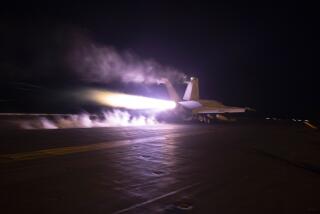Senator Says U.S. Won’t Permit Attacks on Ships
- Share via
MANAMA, Bahrain — Sen. Jim Sasser, on a fact-finding mission to the area of the devastating Iraqi attack on the guided-missile frigate Stark, said Monday that “the United States will not tolerate any armed attack on American ships by any nation.”
The Tennessee Democrat’s remarks were clearly aimed at Iraq and Iran, belligerents in the Persian Gulf War, now nearly seven years old. An Iraqi missile strike May 17 killed 37 American sailors on the U.S. Navy warship.
Officials in Kuwait, where Sasser arrived after leaving Bahrain, said the senator assured them that the United States is determined to protect freedom of navigation in the gulf and ensure the flow of oil to industrialized countries.
Meets With Emir
Sasser spent 36 hours here, where he visited the heavily damaged Stark now at anchor offshore and met with the ruling emir, Sheik Isa ibn Salman al Khalifa, and with Sheik Mohammed ibn Mubarak al Khalifa, the foreign minister. He then flew to Kuwait, where he explored security measures for Kuwaiti oil tankers, scheduled soon to sail the gulf sea lanes under the American flag.
Meanwhile, a team of eight investigators from the Pentagon and State Department met with the American ambassador in the fortified U.S. Embassy building in Baghdad, the Iraqi capital, to begin their probe into the attack on the Stark.
The team, led by Rear Adm. David Rogers, chief of operations with the U.S. Joint Chiefs of Staff, arrived Monday from Bahrain and conferred in central Baghdad for more than two hours with U.S. Ambassador David Newton.
As they left the embassy, Rogers said it was not yet known if they would be able to question the fighter-bomber pilot who Iraq says was responsible for the fateful attack.
Navy, Air Force, Army Experts
Before flying to Baghdad, the team examined the frigate at anchor off Bahrain.
The experts are expected to be in Baghdad for at least two days. Other investigating teams from the House of Representatives and Senate are expected to visit the Iraqi capital later, but U.S. officials said that no firm dates have been set.
The eight-man team includes senior Navy, Air Force and Army officers, all specialists in weapons systems, electronics, communications and air defense. The only civilian is Greg Berry, an Iraq specialist from the State Department.
Iran and Iraq have been at war since September, 1980, and between them have attacked 355 ships in the Persian Gulf in actions aimed at damaging each other’s economy.
Also investigating the missile attack on the Stark is a five-member team of staff members of the House Armed Services Committee. The team’s leader, John Lally, said he spent Monday aboard the Stark, where he met with the captain and crew, “but I am not prepared to talk to the press about it.”
Crew Clearing Debris
A U.S. Navy officer said that Lally’s delegation visited the command ship LaSalle, flagship of the U.S. Persian Gulf task group, before proceeding to the Stark. The crew there is still clearing debris from the devastation.
The House committee chairman, Rep. Les Aspin (D-Wis.), sent the staff team in part to consider the question of whether the Stark’s failure to detect incoming missiles until the final seconds stemmed from any inadequacy of equipment or personnel.
The Stark is one of seven vessels in a Persian Gulf task group.
More to Read
Get the L.A. Times Politics newsletter
Deeply reported insights into legislation, politics and policy from Sacramento, Washington and beyond. In your inbox twice per week.
You may occasionally receive promotional content from the Los Angeles Times.








